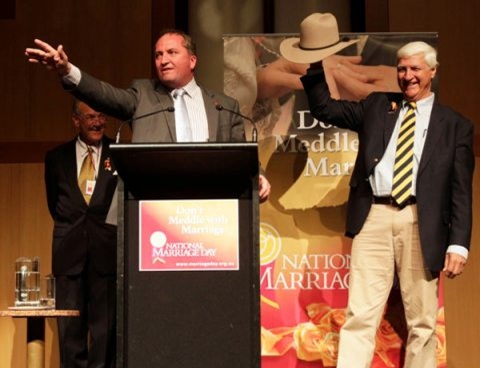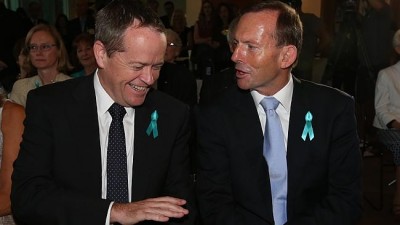Buoyed by their success at the 2013 election, the Abbott government has wasted no time in using their power to feather their own nest and to promote, reward and employ their backers. Whilst all governments do this to a degree, Abbott has taken it to a whole new level of blatant nepotism and servitude to his masters at the expense of the public interest.
On the 9th of September 2013, before the count was even finalised, Julie Bishop flexed her muscles by her petty and vindictive decision to revoke the appointment of Steve Bracks as consul-general in New York. He had been appointed in May, long before the caretaker period, and was due to start that week.
It’s not as if Ms Bishop had a better person in mind. The position remained vacant for six months until it was gifted to Nick Minchin, the man who gave Tony Abbott leadership of the Liberal Party in return for his conversion to climate change denial.
And she didn’t stop there. Despite having 18 months of his term left, Mike Rann was booted from the position of High Commissioner to the UK to make way for Alexander Downer. This is the man who, under the guise of providing foreign aid, authorised the bugging of the cabinet offices of the East Timor parliament to further the commercial interest of Woodside Petroleum who coincidentally employed him after he left politics.
Rather than investigate this matter, which is before the International Court of Justice, George Brandis authorised raids to steal the evidence and cancelled the passport of the prime witness.
Brandis also hit the ground running to look after his mates. So appalled was he by the conviction of Andrew Bolt, he immediately set about changing the laws to protect the rights of bigots. To champion the cause, he made the inexplicable decision to sack the Human Rights Commissioner for the Disabled, Graeme Innes, and appoint the IPA’s Tim Wilson (without advertising, application, interview, relevant qualifications or experience), to fight for the repeal of Section 18c of the racial discrimination laws,
After a huge backlash from the public, Brandis was directed to drop his crusade, and there sits Tim Wilson, drawing a salary of $400,000 including perks, with nothing to do.
Mr Wilson’s appointment followed Senator Brandis’ announcement that he had chosen former Howard government minister David Kemp – the son of IPA founder Charles Kemp – to chair the advisory council of Old Parliament House. This position had been given to Barrie Cassidy but Brandis forced him to resign. Along with Kemp, two others were appointed: Heather Henderson, the only daughter of Liberal Party founder Sir Robert Menzies; and Sir David Smith, whose place in history was assured on November 11, 1975, on the steps of Old Parliament House, when as official secretary to governor-general Sir John Kerr he was required to read out the proclamation sacking the Whitlam government.
Brandis, as Minister for the Arts, also appointed Gerard Henderson as chairman of the judging panel for the nonfiction and history category of the Prime Minister’s Literary Awards, Australia’s richest book prize.
Tony Abbott only took a few hours to begin his Night of the Long Knives. The swearing-in ceremony had barely finished when the Prime Minister’s office issued a press release, announcing three departmental secretaries had had their contracts terminated and the Treasury Secretary would stand down next year.
The head of Infrastructure Australia also quit or was sacked for his criticism of the government’s interference with the independence of his organisation. The head of the NBN, along with the entire board, were also replaced.
All funding for the National Congress of Australia’s First Peoples was withdrawn. Countless charities and advisory groups have been defunded.
Climate change and renewable energy bodies have been under constant attack with many disbanded and the rest hanging on temporarily by the grace of the Senate.
To replace all these experienced experts, we have seen an astonishing array of people appointed to high-paying positions as advisers, reviewers, commissioners, consultants, board members, envoys –
Maurice Newman, head of Tony Abbott’s 12-member Business Advisory Council, aged 76, a former head of the stock exchange and the ABC and a founder of another of the right-wing think tanks, the Centre for Independent Studies. Climate sceptic.
Dick Warburton, 72, the former chairman of the petrochemical company Caltex, among other corporate affiliations. Appointed to review Australia’s 20 per cent Renewable Energy Target (RET). Climate sceptic. Also appointed was Brian Fisher. Climate modelling done by his firm has been presented to the review panel by the oil and gas sector, as part of its campaign against the RET.
Tony Shepherd, former head of the Business Council of Australia (BCA), aged 69. Appointed to head the Commission of Audit. Climate sceptic. Former Liberal senator Amanda Vanstone and Liberal staffer and Chicago-school economist Peter Boxall were on the commission’s panel. Peter Crone, director of policy at the BCA, was head of the secretariat.
David Murray, 65, the former CEO of the Commonwealth Bank, appointed head of the government’s Financial System Inquiry. Climate sceptic.
Henry Ergas, 62, regulatory economist and columnist for the Australian. Appointed to Communications Minister Malcolm Turnbull’s “expert panel” to assess the costs and benefits of Turnbull’s “copper magic” NBN-lite. Climate sceptic who recently made a video with Christopher Monckton.
Kevin Donnelly, the IPA-aligned former chief-of-staff to Kevin Andrews and champion of corporal punishment. Appointed to review the National Curriculum. He then appointed Barry Spurr, author of racist sexist ranting emails, to advise on the literature curriculum.
Warren Mundine, son-in-law of Gerard Henderson. Appointed to advise on Indigenous affairs. Has set up a nice new office, 10km away from his department.
Jim Molan, retired general and author of the tow-back policy. Appointed as Special Envoy to fix the asylum seeker problem and to advise on the defence white paper, a position he quit after three weeks citing differences with the Defence Minister.
Janet Albrechtsen, columnist for the Australian, and Neil Brown, former deputy Liberal Party leader. Appointed to the panel overseeing appointments to the boards of the ABC and SBS.
It seems the pool of “experts” nowadays is confined to the IPA, the Australian, the Business Council, and the Howard government, and climate change scepticism is an essential criterion.
Aside from jobs for the boys (and a couple of girls who think feminism is a dirty word), we have also seen the blatant promotion of the coal industry with fast-tracking of approvals. We have seen the repeal of gambling reform laws. We have seen the delay and watering down of food and alcohol labelling laws. We are seeing an attack on the minimum wage and penalty rates. All of these measures are against the best interests of the people and purely designed to reward business donors.
Our Prime Minister personally introduces James Packer to international government and business leaders around the world to promote his quest to build more casinos. This is despite the fact that his company, Crown, has been implicated in bribery to a Chinese official.
In a recent report, the OECD was scathing of Australia’s record, pointing out that Australia “has only one case that has led to foreign bribery prosecutions, out of 28 foreign bribery referrals received by the Australian Federal Police (AFP) … this is of serious concern”.
One of the 28 cases referred to the AFP related to two properties in Chinese Macau part owned by James Packer’s company, Crown.
A former Macau official is currently serving a 289-year sentence for accepting bribes of up to $100 million, with various suspect projects named, including the casinos.
The OECD report notes Australian police did not launch a domestic investigation into any possibility of Crown’s involvement.
In another scandal, former Leighton Holdings construction boss Wal King has denied all knowledge of a $42 million bribe Leighton is accused of having paid in Iraq. Leighton Holdings continue to be awarded lucrative government contracts.
Another of the 28 cases referred to by the OECD relates to payments made by BHP Billiton in China. They note that, unlike Australia, the US has launched two investigations into BHP Billiton
The OECD’s lead examiners expressed concern that the “AFP may have closed foreign bribery cases before thoroughly investigating the allegations”.
The only foreign bribery investigation that has resulted in prosecutions in Australia is the highly publicised case involving the Reserve Bank subsidiaries Securency and Note Printing Australia over which, interestingly, Dick Warburton has been investigated as a former director of Note Printing Australia.
One must wonder about a police force that can spend hundreds of thousands investigating and prosecuting Peter Slipper over $900 worth of cab charges, that can mobilise over 800 police to conduct raids leading to the arrest of one teenager who got a phone call from a bad person and the confiscation of a plastic sword, but who refuse to investigate widespread corruption in industry.
And every day it gets just a little bit worse.
A Sydney restaurant owned by Tourism Minister Andrew Robb and his family is being promoted by a government-funded $40 million, 18-month Tourism Australia campaign that targets 17 key global markets to sell the Australian “foodie” experience to the world.
The Robb family restaurant, Boathouse Palm Beach, is showcased on Tourism Australia’s “Restaurant Australia” website, which was launched in May, as the “ultimate day trip destination” just an hour from Sydney and the “perfect place for a relaxed family outing”.
Perhaps Tony Abbott’s daughters earned their job at the UN and $60,000 scholarship. Perhaps the contract to BMW had nothing to do with them giving an Abbott girl a gig. We will never know.
This is only a sample of how the ruling class are using our nation as their personal plaything, of how they openly flaunt convention and even the law, of how they silence dissent and promote their agenda, of how they bestow rewards.
Until this abuse of power is curtailed, politicians will rightly be reviled as the least trustworthy people in the country.












